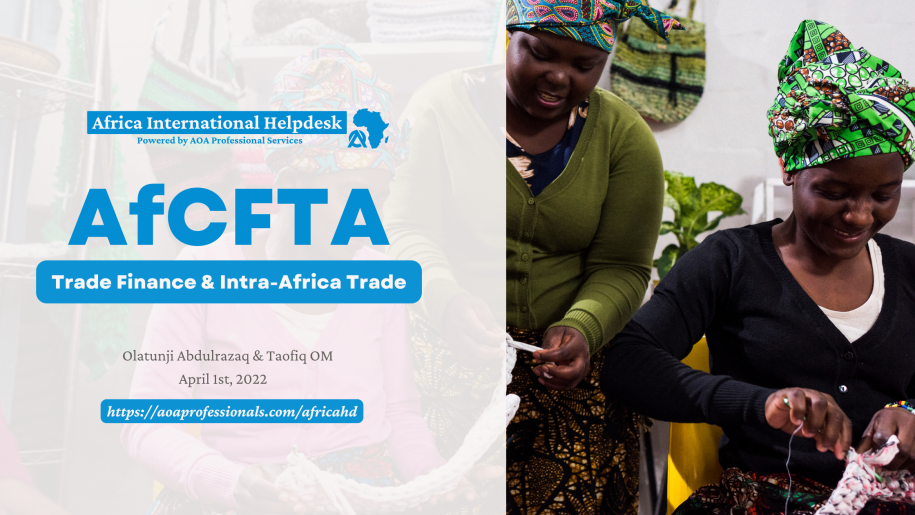Trade finance represents the financial instruments and products that are used by companies to facilitate international trade and commerce. Trade finance makes it possible and easier for importers and exporters to transact business through trade.
President of the African Development Bank (AfDB), Akinwumi A. Adesina, stated that “trade finance is an important instrument for influencing Africa’s long-term economic development and structural transformation”.
According to Baker McKenzie’s research with Oxford Economics – AfCFTA’s US$ 3 trillion Opportunity – “there are now unprecedented opportunities for Africa, and its trading partners, to reap economic benefits on the back of the possible improvements in transport infrastructure, reduction of red tape for cross-border dealings, renewed funding and improved liquidity”.
AfCFTA and Opportunities for Africa:
African Continental Free Trade Area (AfCFTA) will help African countries to diversify their economies, grow production capacity and broaden the range of products made in Africa, in particular improving the production of manufactured goods (and the potential for multinational companies to set up manufacturing plants in Africa). Closer integration of neighbouring economies is a potential avenue for creating scale and competitiveness through domestic market enlargement, thereby promoting development, and improving foreign investment through greater efficiency.
The AfCFTA is expected to positively affect domestic manufacturing. For example, Manufacturing is currently the second-largest sector in the Nigerian economy (12.8% of GDP in 2020 at current prices), and the Government set an ambitious target of 20% manufacturing share of GDP by 2023.
In Nigeria, the National Association of Chambers of Commerce, Industry, Mines and Agriculture (NACCIMA) is also closely working with the Nigerian Export Promotions Council (NEPC) to develop its members for export so that member’s products will meet international standards and facilitate acceptance globally.
AfCFTA and Intra-African Trade:
Intra-African trade is very low, standing at just 16 per cent of the continent’s total trade, compared with 19 per cent in Latin America, 51 per cent in Asia, 54 per cent in North America and 70 per cent in Europe.
The AfCFTA, fundamentally, will put African economies-and African citizens on a better economic footing. It will enhance competitiveness and stimulate investment, innovation, and economic growth by increasing efficiency and eliminating trade barriers.
The agreement commits countries to remove tariffs on 90 per cent of goods and incrementally apply the same to services. In addition, the removal of tariffs on goods, in particular, is projected to increase the value of intra-African trade by 15 to 25 per cent by 2040. This would translate to between $50 billion and $70 billion in value.
AfCFTA and Pan-African Payments and Settlements Systems (PAPSS):
The African Export-Import Bank (Afreximbank), working with the AfCFTA and the Central Bank of Nigeria (CBN) to come up with the PAPSS where if you, as a Nigerian exporter, send goods to Ghana, you will be paid locally in Naira; the other person does not need to go and be looking for the dollar to pay you. In the same way, a company will not go and be looking for a Dollar to carry out a transaction.
PAPSS was developed by Afreximbank and Launched in January 2022 in Accra, Ghana.
It is expected to boost Intra-African trade by transforming and facilitating payment, clearing and settlement for cross-border trade across Africa. PAPSS will enable a customer in one African country to pay in his currency, while a seller in another country receives payment also in his currency.
At the unveiling of the payment platform, AfCFTA Secretary-General Wamkele Mene stated that the PAPSS is expected to boost intra-African trade and save the continent $5 billion yearly in payment transaction costs, while also playing an increasingly significant role in accelerating the continent’s transactions underpinning the operationalisation of the AfCFTA.
The Afreximbank, as the main Settlement Agent for PAPSS, will provide settlement guarantees on the payment system and overdraft facilities to all settlement agents, in partnership with Africa’s participating Central Banks.PAPSS will effectively eliminate Africa’s financial borders, formalise and integrate Africa’s payment systems, and play a major role in facilitating and accelerating the huge AfCFTA-induced growth curve in intra-African trade.
Before PAPSS, over 80 per cent of African cross-border payment transactions originating from African banks were said to be routed offshore for clearing and settlement using international banking relationships.
Conclusion:
The President of the African Development Bank stated that “Trade finance is an important instrument for influencing Africa’s long-term economic development and structural transformation. It can play a cross-sectoral role to facilitate the delivery of the Bank’s, “High 5” strategic priorities to “Power and Light Up Africa”, “Feed Africa”, “Industrialize Africa”, “Integrate Africa” and “Improve the quality of life of the people of Africa.”
Intra-African trade accounted for approximately USD 1 billion of total trade supported, 60% of all supported transactions are attributable to SMEs. Similarly, over 62% of all transactions have a tenor of fewer than 6 months, signifying the short-term nature of trade finance transactions in general.
Culled from AfDB’s Trade Finance Program
DISCLAIMER:
The material contained in this publication is provided for general information purposes only and does not contain a comprehensive analysis of each item described. Before taking (or not taking) any action, readers should seek professional advice specific to their situation. No liability is accepted for acts or omissions taken in reliance upon the contents of this alert.
AOA Professional Services is an indigenous tax, regulatory and advisory service firm driven by the values of professionalism and partnership. For further information on the subject matter, reach out to our Africa International Helpdesk

